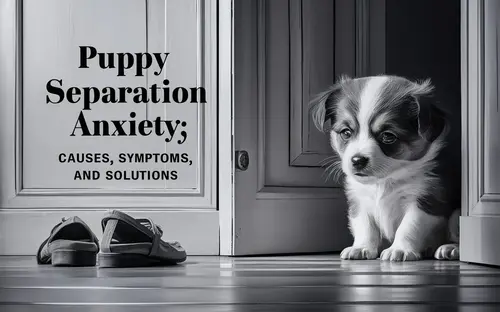There’s nothing quite like the joy of welcoming a furry bundle of happiness into your home. Puppies are adorable, playful, and full of boundless energy—but they also require a lot of attention and care. One of the most common challenges new puppy parents face is separation anxiety, which can be a real headache if left unchecked. In this comprehensive guide, we’ll explore the causes, symptoms, and effective solutions to help your pup overcome this distressing condition.
What is Puppy Separation Anxiety?
Puppy separation anxiety is a behavioral issue that arises when your furry friend experiences excessive stress or panic when left alone or separated from their primary caregiver. It’s a natural response rooted in their pack mentality and strong desire for companionship. While it’s perfectly normal for puppies to experience some level of distress when their owners leave, severe separation anxiety can lead to destructive behaviors, incessant barking, and even self-harm.
Causes of Puppy Separation Anxiety
Genetic Predisposition
Some breeds, particularly those bred for companionship or guarding, may be more prone to developing separation anxiety. For example, velcro dogs like the Cavalier King Charles Spaniel, or watchdogs like the German Shepherd, tend to have a stronger desire for constant human interaction.
Lack of Early Socialization
Puppies who haven’t been properly socialized during their critical developmental period (between 8-16 weeks) may struggle to cope with being alone. Early socialization helps them learn to adapt to different environments and situations, reducing the likelihood of developing separation anxiety later on.
Changes in Routine or Environment
Significant changes in a puppy’s routine or living environment can trigger separation anxiety. Moving to a new home, the addition of a new family member, or even a change in their owner’s work schedule can be stressful and contribute to this issue.
Symptoms of Puppy Separation Anxiety
Destructive Behavior
One of the most common signs of separation anxiety is destructive behavior. Your puppy may chew on furniture, scratch at doors or walls, or even dig through carpets or bedding when left alone. This behavior stems from their distress and is often an attempt to escape or reunite with their owner.
Excessive Barking or Whining
Puppies suffering from separation anxiety may bark, whine, or howl incessantly when left alone. This vocalization is a cry for attention and a way for them to cope with the perceived abandonment.
Potty Accidents
Even if your puppy is fully house-trained, separation anxiety can cause them to have accidents inside the home. The stress and anxiety they experience can override their learned behaviors, leading to urination or defecation in inappropriate areas.
Excessive Drooling or Panting
In some cases, puppies with separation anxiety may drool excessively or pant heavily, even when they haven’t been engaging in physical activity. These physiological responses are indicators of their heightened stress levels.
Solutions for Puppy Separation Anxiety
Gradual Desensitization
One of the most effective ways to help your puppy overcome separation anxiety is through gradual desensitization. This process involves slowly exposing your puppy to short periods of alone time, starting with just a few minutes and gradually increasing the duration. Rewarding them with treats or praise when they remain calm during these periods can help reinforce positive behaviors.
Exercise and Mental Stimulation
Ensuring your puppy gets plenty of physical and mental exercise can help alleviate separation anxiety. A tired puppy is less likely to engage in destructive behaviors when left alone. Additionally, providing interactive toys and puzzle feeders can keep their minds occupied and reduce boredom, which can exacerbate anxiety.
Crate Training
While some owners may be hesitant about crate training, it can be an effective tool in managing separation anxiety. Properly introducing your puppy to a cozy, safe space like a crate can provide them with a sense of security and comfort when you’re away.
Counterconditioning with Positive Associations
Counterconditioning involves creating positive associations with being alone. For example, you can provide your puppy with special treats or long-lasting chews only when you’re about to leave. This way, they’ll begin to associate your departure with something enjoyable, rather than something to be anxious about.
Seeking Professional Help
In severe cases of separation anxiety, it may be necessary to seek the guidance of a qualified animal behaviorist or veterinarian. They can provide personalized advice and, if necessary, recommend medication or other therapeutic interventions to help your puppy cope.
Conclusion
Puppy separation anxiety can be a challenging and frustrating experience for both pet owners and their furry companions. However, with patience, consistency, and the right strategies, it’s a condition that can be effectively managed and overcome.
By understanding the causes, recognizing the symptoms, and implementing solutions like gradual desensitization, exercise, crate training, and counterconditioning, you can help your puppy feel secure and comfortable when left alone.
Remember, every puppy is unique, and it may take some trial and error to find the approach that works best for your furry friend.
With time, love, and dedication, you can help your puppy overcome their anxiety and enjoy a happy, well-adjusted life with their human family.
FAQs
Q1: How long does it typically take to overcome puppy separation anxiety?
A: The duration can vary greatly depending on the severity of the anxiety and the consistency of the training approach. While some puppies may show improvement within a few weeks, others may take several months to fully overcome their separation anxiety. Patience and perseverance are key.
Q2: Can separation anxiety in puppies lead to long-term behavioral issues if left untreated?
A: Yes, if left unaddressed, separation anxiety can potentially develop into more severe and long-lasting behavioral problems. Puppies may become increasingly destructive, aggressive, or develop other anxiety-related issues that can be challenging to resolve later in life.
Q3: Is it better to leave a puppy with separation anxiety alone or have someone stay with them?
A: While having someone stay with the puppy can provide temporary relief, it’s not a long-term solution and can reinforce the anxiety. It’s better to gradually desensitize the puppy to being alone through consistent training and positive reinforcement.
Q4: Can medications help with puppy separation anxiety?
A: In severe cases, veterinarians may prescribe anti-anxiety medications or supplements to help manage the symptoms of separation anxiety. However, these should be used in conjunction with behavior modification techniques and under professional guidance.
Q5: How can I prevent separation anxiety from developing in my puppy?
A: Proper socialization during the critical developmental period, gradually accustoming your puppy to being alone, providing plenty of exercise and mental stimulation, and maintaining a consistent routine can all help prevent separation anxiety from developing in the first place.




